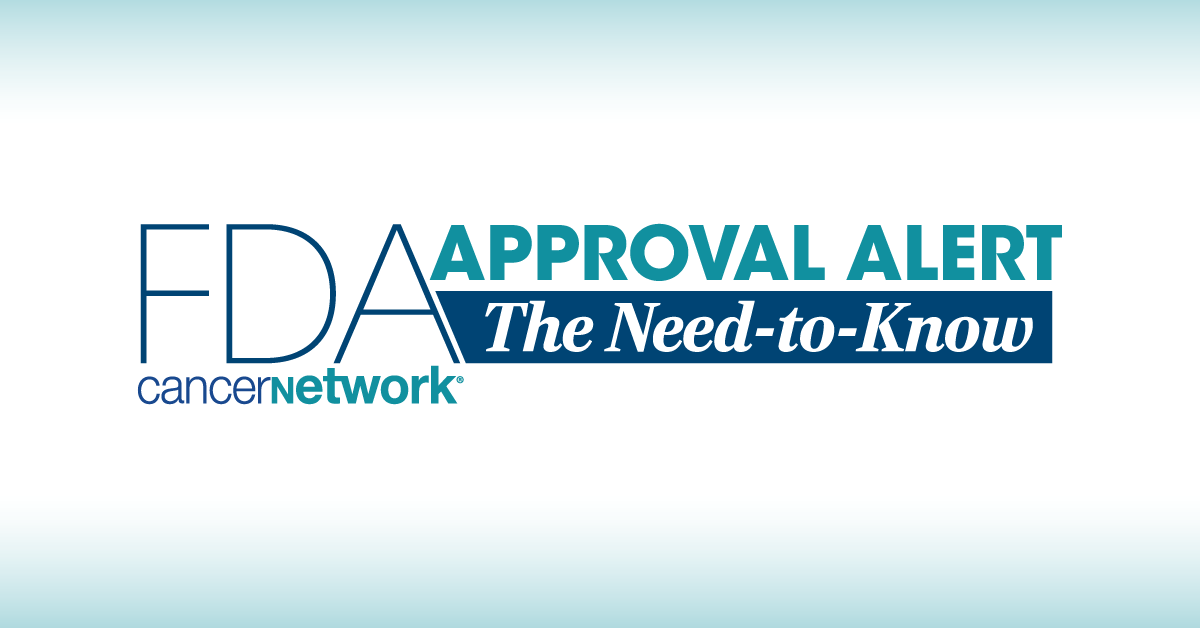FDA Approves Imetelstat for Lower-Risk MDS With Transfusion-Dependent Anemia
The FDA has approved imetelstat (Rytelo) for the treatment of adult patients with low- to intermediate-1 risk myelodysplastic syndromes with transfusion-dependent anemia requiring at least 4 red blood cell units over 8 weeks who have not responded to, or have lost response to, or are ineligible for erythropoiesis-stimulating agents.
FDA

The FDA has approved imetelstat (Rytelo) for the treatment of adult patients with low- to intermediate-1 risk myelodysplastic syndromes (MDS) with transfusion-dependent anemia requiring at least 4 red blood cell units over 8 weeks who have not responded to, have lost response to, or are ineligible for erythropoiesis-stimulating agents (ESAs).1
The approval is based on findings from the phase 3 IMerge trial (NCT02598661), which showed that imetelstat demonstrated significantly higher rates of red blood cell transfusion independence (RBC-TI) vs placebo for at least 8 consecutive weeks at 39.8% (95% CI 30.9%–49.3%) compared with 15.0% for placebo (95% CI, 7.1%–26.6%; P <.001) and for at least 24 weeks at 28.0% (95% CI 20.1%-37.0%) vs 3.3% (95% CI 0.4-11.5), respectively (P <.001).
“For patients with lower-risk MDS [LR-MDS] and anemia who are transfusion dependent, we have very few options today and often cycle through available therapies, making the approval of [imetelstat] potentially practice changing for us,” study investigator Rami Komrokji, MD, vice chair, Malignant Hematology Department, Moffitt Cancer Center, stated in a news release.1 “What is exciting about [imetelstat] is the totality of the clinical benefit across [patients with] LR-MDS irrespective of ring sideroblast status or high transfusion burden, including sustained and durable transfusion independence and increases in hemoglobin levels, all within a well-characterized safety profile of generally manageable cytopenias. The treatment goal for patients with LR-MDS and anemia is transfusion-independence and before today, this wasn’t possible for many patients.”
In the double-blind phase 3 IMerge trial, patients were randomly assigned 2:1 to receive imetelstat at 7.5 mg/kg (n = 118) or matched placebo (n = 60) intravenously every 4 weeks until progressive disease, unacceptable toxicity, or withdrawal.2 Investigators stratified patients based on previous RBC transfusion and International Prognostic Scoring System (IPSS) risk group.
The trial’s primary end point was RBC-TI for at least 8 weeks. Secondary end points included 24-week RBC-TI, duration of RBC-TI, time to RBC-TI, and safety. Patients 18 years and older with MDS, and low or intermediate-1 risk disease based on IPSS guidelines, RBC transfusion dependence requiring at least 4 units over an 8-week period, and relapsed/refractory disease or ineligibility to receive ESAs were able to enroll on the trial.
Additional findings showed that RBC-TI was durable and sustained in the imetelstat-treated population. The median RBC-TI duration for 8-week responders and 24-week responders was an estimated 1 year and 1.5 years, respectively.
Frequent grade 3/4 adverse effects (AEs) reported with imetelstat in the IMerge trial included neutropenia (72%) and thrombocytopenia (65%). These toxicities lasted for a median of less than 2 weeks, and events were mitigated to grade 2 or lower in under 4 weeks for more than 80% of patients. Investigators managed cytopenias via dose modifications.
“With the approval and availability of [imetelstat], we believe eligible patients with lower-risk MDS can potentially experience meaningful clinical benefit, particularly the potential for greater than 24 weeks of freedom from the burden of red blood cell transfusions and symptomatic anemia,” said John A. Scarlett, MD, chairman and chief executive officer of Geron, the developer of imetelstat.1 “The approval of [imetelstat] as the first telomerase inhibitor is a testament to the power of our science and the passion of our people to innovate in the field of blood cancer.”
The FDA accepeted a new drug application (NDA) for imetelstat as a treatment for those with LR-MDS in August 2023.3 Supporting data for the NDA came from the IMerge trial.
The FDA’s Oncologic Advisory Drug Committee (ODAC) voted in favor of the clinical benefit of imetelstat for this patient population in March 2024.4 In a 12-to-2 vote, the committee decided that the agent’s clinical benefits outweighed its risks in adult patients.
Reference
- Geron Announces FDA Approval of RYTELO™ (imetelstat), a First-in-Class Telomerase Inhibitor, for the Treatment of Adult Patients with Lower-Risk MDS with Transfusion-Dependent Anemia. Geron Corporation. News release. June 6, 2024. Accessed June 6, 2024. https://www.businesswire.com/news/home/20240606850162/en/Geron-Announces-FDA-Approval-of-RYTELO%E2%84%A2-imetelstat-a-First-in-Class-Telomerase-Inhibitor-for-the-Treatment-of-Adult-Patients-with-Lower-Risk-MDS-with-Transfusion-Dependent-Anemia
- Platzbecker U, Santini V, Fenaux P, et al. Imetelstat in patients with lower-risk myelodysplastic syndromes who have relapsed or are refractory to erythropoiesis-stimulating agents (IMerge): a multinational, randomised, double-blind, placebo- controlled, phase 3 trial. Lancet. Published online December 1, 2023. doi:10.1016/S0140-6736(23)01724-5
- Geron announces FDA acceptance of new drug application for imetelstat for the treatment of lower risk MDS. News release. Geron Corporation. August 21, 2023. Accessed June 7, 2024. https://shorturl.at/DOYZ6
- March 14, 2024 Meeting of the Oncologic Drugs Advisory Committee (ODAC). Streamed live March 14, 2024. Accessed June 7, 2024. https://tinyurl.com/y983ewxj
Navigating AE Management for Cellular Therapy Across Hematologic Cancers
A panel of clinical pharmacists discussed strategies for mitigating toxicities across different multiple myeloma, lymphoma, and leukemia populations.